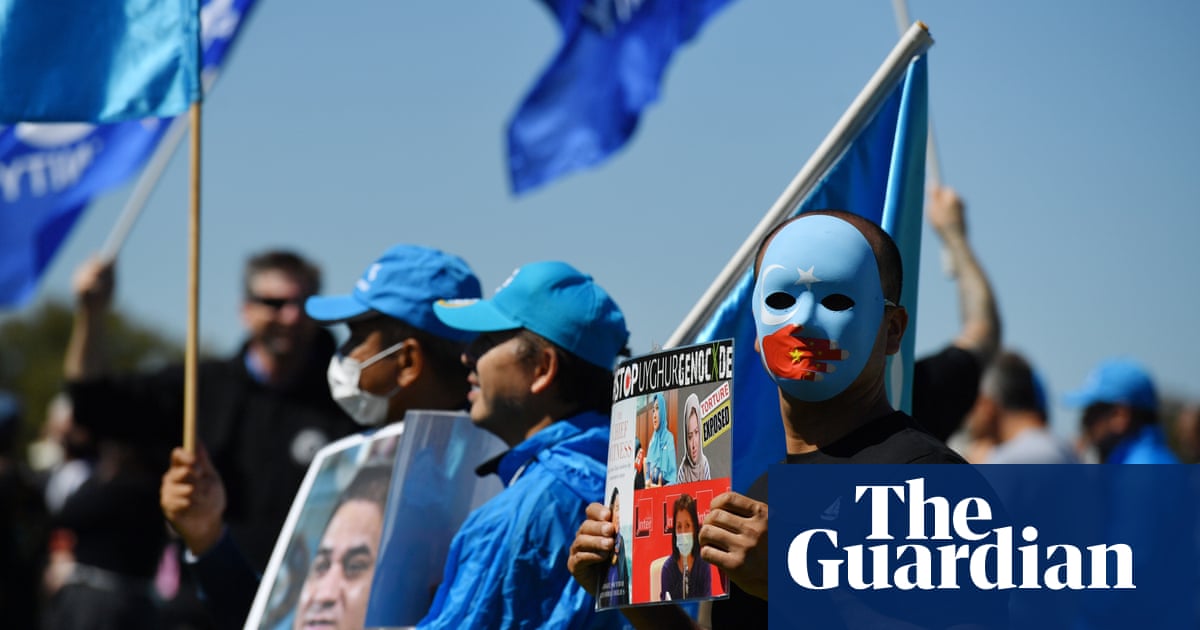Albanese government urged to keep focus on human rights as it rebuilds relationships in Asia
The Albanese government should not compromise on human rights as it seeks to repair relationships with China and south-east Asian countries, a leading advocacy group has warned.
Human Rights Watch has written to the prime minister, Anthony Albanese, urging him to “impose targeted sanctions against Chinese government officials who are responsible for crimes against humanity” in Xinjiang.
The organisation also called on the new government to impose sanctions on senior military leaders in Myanmar – something that Labor is likely to consider given that it repeatedly criticised the Coalition for failing to act after the February 2021 coup.
In a letter to Albanese, the group said it “looks forward to working with you to make the protection of human rights a strong pillar of Australia’s domestic and foreign policy”.
Albanese promised to strengthen relations with south-east Asia during a trip to Indonesia last week, while the diplomatic freeze between China and Australia ended with a meeting between the deputy prime minister, Richard Marles, and his Chinese counterpart in Singapore on Sunday.
Sophie McNeill, an Australian researcher at Human Rights Watch, welcomed the government’s early engagement with the region but called for a continued focus on human rights.
“Changing the way we talk about and to the Chinese government doesn’t have to mean taking a backwards step with Beijing or compromising on human rights,” she said.
McNeill said the foreign affairs minister, Penny Wong, had the potential “to show that Australia could listen and engage with the region, while also making it clear she would prioritise human rights and international law”.
“It is so critical that the new Albanese government enact targeted sanctions on human rights abusers as soon as possible, to demonstrate that Australia will hold countries violating human rights to account,” she said.
The letter to Albanese and senior ministers from Human Rights Watch’s acting Asia director, Elaine Pearson, and McNeill outlines areas where “the right mix of pressure and engagement from Australia could make a significant difference in promoting respect for human rights”.
“Your government should impose targeted sanctions against Chinese government officials who are responsible for crimes against humanity against Uyghurs and other Turkic peoples in Xinjiang.”
The letter highlights Labor’s pledge last year to “ensure that Australia stands up for human rights in China and work with the international community to hold China to account for its international commitments”.
Wong had previously called on the Morrison government to “consider targeted sanctions on foreign companies, officials and other entities known to be directly profiting from Uyghur forced labour and other human rights abuses”.
The Human Rights Watch letter encourages the Albanese government to call on the UN high commissioner for human rights to immediately release her long-delayed report on Xinjiang.
In addition to imposing sanctions against Myanmar military figures, the new government should pursue human rights issues with other south-east Asian countries including Indonesia.
Human Rights Watch called on Albanese to “publicly and privately raise cases of abuse by security forces in Papua and West Papua with President Joko Widodo and make clear that future military and police cooperation is dependent upon adequate investigations and prosecutions of credible accusations of serious crimes”.
The letter asked the government to “highlight the importance of accountability to the new government of the Philippines and urge the authorities to investigate and prosecute police and other law enforcement officials implicated in extrajudicial killings of drug suspects”.
Despite Australia’s growing political and trade ties with India, the new government should raise “concerns at the erosion of the rule of law and the adoption of laws and policies that discriminate against religious minorities, especially Muslims”.
The push for sanctions against Chinese officials has been backed by Justin Bassi, who was chief of staff to the former foreign affairs minister Marise Payne.
Bassi, now the head of the Australian Strategic Policy Institute, said the new government “should use the Magnitsky powers to sanction those responsible for human rights abuses against Muslim minorities in Xinjiang”.
“All other Magnitsky countries – the US, the UK and Canada – and the EU did so last year and it was a mistake for the previous Australian government to have left it to the new government,” Bassi wrote after attending the Shangri-La Dialogue in Singapore.
Any such move would be likely to trigger pushback from the Chinese government, which flatly denies allegations of human rights abuses in Xinjiang. The former Chinese ambassador to Australia said last year Beijing would respond “in kind” to any Australian sanctions.
Marles said in Tokyo on Wednesday that his meeting with Wei had “ended with a desire on the part of both of us to try to put the bilateral relationship into a better place”.
The trade minister, Don Farrell, was unable to able to secure a meeting with his Chinese counterpart on the sidelines of a World Trade Organization conference in Geneva this week.













